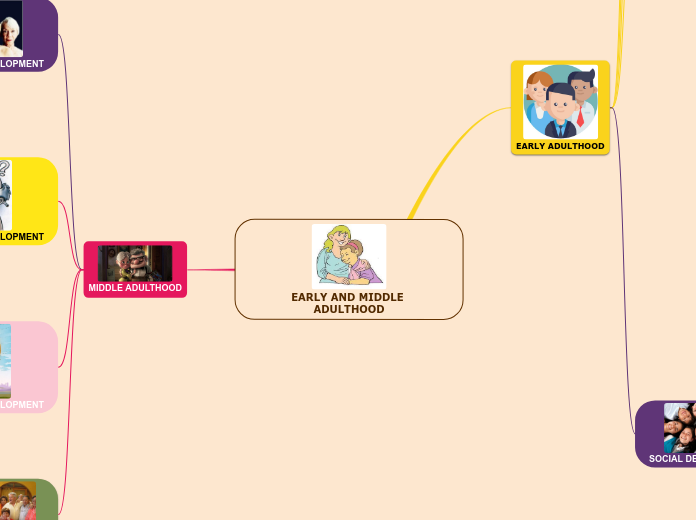a KARMINA MONTELON 4 éve
880
EARLY AND MIDDLE ADULTHOOD
Middle adulthood encompasses significant changes in personality, physical abilities, and social roles. Personality development during this stage can be explained by two main models:

a KARMINA MONTELON 4 éve
880

Még több ilyen
Type in the name of the book you have read.
Take notes while you read the book. Type here the resources, books, or websites that the author mentioned and you want to check out later.
Type the main events of the book, classifying them in: events from the beginning, events from the middle, and events from the end of the book.
Describe the story visually. Add a representative picture for each of them.
The life events model: This is the most accepted model at present. It explains that personality development occurs thanks to particular events in people's lives, rather than through age and its crises. It is these events that produce similar psychological situations in people, regardless of their ages.
The normative crisis model: this model explains that personality development occurs through crises at specific age stages. In these crises there is strong psychological questioning or turmoil.
In contrast to the main idea, the theme is the message, lesson or moral of the book.
Some tips to find out the theme of the book easier:
Take notes while you read the book. Write here your favorite quotes from the book.
The main idea is what the book is mostly about.
Some tips to find out the main idea of a book easier:
WORK: Work is influenced by many aspects of development, physical, intellectual, emotional and social.
Young workers are more concerned with how interesting their work may be and what developmental possibilities it may present.
HIGHER EDUCATION AND WORK: The university period can be a time of intellectual search and personal growth; it offers the possibility of molding a new personal identity.
College students can present an identity crisis that can lead to serious problems (drug and alcohol abuse, eating disorders, suicide).
FRIENDSHIP: In early adulthood it occurs more frequently than in other stages of life. It implies trust, respect, enjoyment of each other's company, understanding, among others.
PATERNITY: This event marks a period of transition in the life of the couple, since the arrival of a new member alters or impacts the dynamics of the couple.
The desire to have children is almost universal Different psychological approaches:
Other theorists: parenthood is part of a natural and universal process of the animal world.
Erikson: childbearing is a basic developmental need.
Freud: the instinctive desire of women.
SEXUALITY: The young adult must achieve:
Determine the lifestyle they will lead
Responsibility and equality in relation to their sexuality
Competence
Independence
DIVORCE: Kersten (1990) states that disaffection occurs in three stages: initial, intermediate and final. The latter is characterized by the desire to end the marriage.
MARRIAGE: The quality of married life has a strong influence on the happiness and satisfaction of individuals. The family cycle is divided into stages that reflect the changes that have occurred.
COHABITATION: There is more physical aggression than in marriage.
Post-marital disillusionment occurs earlier in couples who have cohabited.
BONFOLDNESS: Stein (1981), proposes four typologies of bachelors: voluntary temporary or stable and involuntary temporary or stable.
LOVE: Rice (1993), divides love into five elements:
Altruistic love: genuine interest and concern, giving and receiving are mutual.
Filial love: based on companionship or common interest.
Dependent love: in extreme cases it could turn into obsession.
Erotic love: sexual attraction.
Romantic love: tenderness or passion, intense feelings.
Type the names of the book characters. Start with the main character.
Draw arrows to represent the relationship between them and if it is possible write on them what they represent for each other (if they are relatives, friends, lovers, enemies etc.)
RIGHT TIMES OF OCCURRENCE OF EVENTS MODEL: More stable conception of development states that the changes produced depend more on social events.
NORMATIVE CRISIS MODELS: "They describe development as a definite sequence of social and emotional changes with age".
What are the characteristics that best describe the character? Type them here.
Influence of the cultural social context.
Relationship with learning processes.
Basic aspects (form, content and use).
What is the reason why the author wrote the book?
Executive stage: they develop the ability to apply knowledge.
Stage of responsibility: the individual uses his cognitive capacities.
Achievement stage: recognizes the need to apply the acquired knowledge.
Who is the author of the book? Type in his/her name.